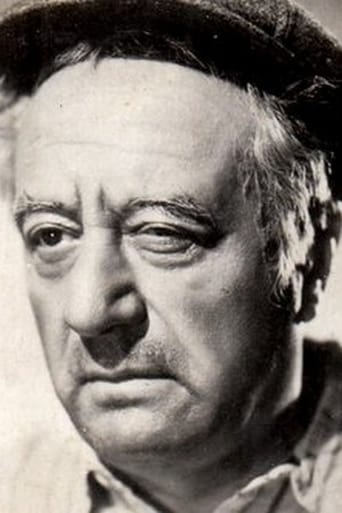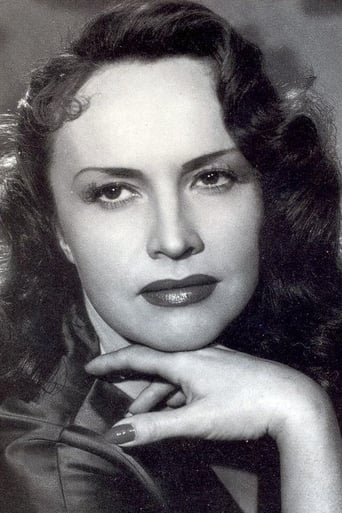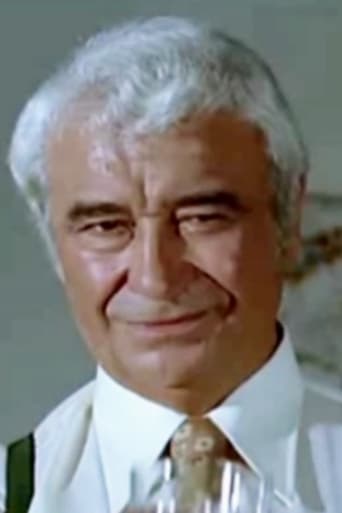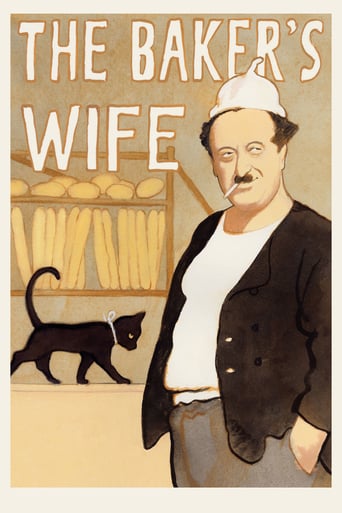
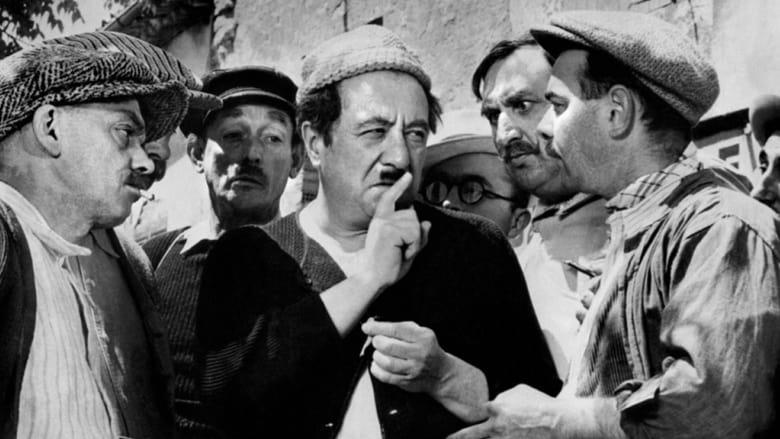
The Baker's Wife (1938)
In this little Provencal village, a new baker, Aimable, settles down. His wife Aurelie is beautiful and much younger than he. She departs with a shepherd the night after Aimable produces his first breads. Aimable is so afflicted that he can not work anymore. Therefore, the villagers, who initially laughed at his cuckoldry, take the matter very seriously (they want the bread) and organize a plan to find Aurelie and to bring her back to the bakery.
Watch Trailer
Cast
Reviews
Load of rubbish!!
Clever, believable, and super fun to watch. It totally has replay value.
A great movie, one of the best of this year. There was a bit of confusion at one point in the plot, but nothing serious.
This is one of the best movies I’ve seen in a very long time. You have to go and see this on the big screen.
I knew nothing about this French film before I found it listed in the book 1001 Movies You Must See Before You Die, it was rated well by critics, and I hoped it would be something worthy of its placement in the book. Basically in an idyllic Provencal village in the south of France, Aurélie (Ginette Leclerc) is the young and beautiful wife of the new baker, Aimable (Raimu). But the baker is devastated when he finds his wife has left him, she has run off during the night with a handsome young shepherd, Dominique (Charles Moulin). The baker tells the villagers that she has left suddenly to see her mother, but they are not fooled, and their efforts to console him are shunned. He goes to the Sunday mass, and is upset by what seems an unfeeling sermon by an inexperienced young Priest (Robert Vattier), after which he goes to a café and gets publicly drunk. The heartbroken baker can no longer bake bread anymore, so Marquis (Fernand Charpin), who is the local landowner, and the Schoolteacher (Robert Bassac) take the situation in hand, with the priest they arrange a public meeting to discuss solutions. The people decide to mount an exhaustive search to find the baker's wife, as they want to regain their daily bread. One of the people does a report a sighting, she is seen in a glade with the shepherd, naked. The priest and the schoolteacher are chosen for the delicate task of persuading her to return, the shepherd flees, and the priest takes her to a quiet place, which the schoolteacher returns with the good news that she has been found. The priest reads her the story of Jesus and the woman taken in adultery, after this he forgives her and takes her home. The first word the baker's wife says to her husband is "Sorry", he forgives her, but he cannot resist talking about young shepherds who charm her, love her and leave her. It is a simple story of a faithless wife tempted by another man, and the local people working together to help the baker, so he will provide them with their produce, the feeling of the communal atmosphere works well, it is very old-fashioned, including its use of black-and-white, but if it was supposed to be funny, I wasn't laughing much, all in all it's a reasonable comedy drama. Worth watching!
This one comes with a rep that almost dares you NOT to like it for none other than the Great Orson Welles declared it the greatest movie ever made and star Raimu the greatest actor. Welles is no slouch himself and many there are, including myself, who consider his own Citizen Kane to be in the all-time No #1 spot but, let's face it, old Awesome knows a thing or two when it comes to judging celluloid. This is, of course, a Marcel Pagnol production which presupposes several things; it will be set in the South of France barely a Long Shot from Marseille and it's twelve to seven to feature Raimu heading an ensemble cast of Pagnol regulars. So it is here with Raimu as the eponymous baker who has barely sold his first batch than his wife takes it on the Jesse Owens with the local stud. The smiles, if not outright belly laughs, on the faces of the villagers freeze pretty damn quick once they realize that no wife equals no bread which means that they set about locating and returning the wife. End of (very simple) story. But as someone once said it's the way you tell them and Pagnol has Scherezade beat seven ways from the middle; once again as in his celebrated trilogy (Marius, Fanny, Cesar, in case you just got here via a wormhole) he evokes an entire community with just a few strokes of the pen or, in this case, lens, so that what we have is a lovingly painted portrait of a small town not a million miles from the one Jack Ford devised for The Quiet Man and complete with a richly assorted set of residents. The closing scene where the errant wife ignites the fire in the oven may be a tad symbolic but when it occurs in such a warm film who cares.
I really liked this movie a lot--especially because it had such a great ensemble cast. This movie was absolutely stuffed to the brim with characters from this community to give the movie great life and charm. In particular, the acting by Raimu as the baker was dynamite. He is a one-namer (like "Cher") that looks like a slightly skinnier Oliver Hardy and manages to use a wide variety of facial expressions and body language to convey so much emotion. When his heart is broken by his philandering wife, you really find yourself feeling for the guy! Overall, it was extremely well-acted and well-written and I strongly recommend it. However, be forewarned that the videotape by Interama Video Classics is VERY poor quality AND they use white subtitles that are often very hard to read. I don't know why, but almost EVERY French film from the 1930s I have tried to watch on video is almost unwatchable due to the degradation of the print. I'm not sure why this is, but it could easily turn people away from classics like this movie, and that would be quite a loss, as Marcel Pagnol who wrote this film was a true artist and master of his medium.
My favourite of all the Pagnol films, including the recent ones, due to the timeless, moving performance by the great Raimu as the lovelorn baker. The French stars of that period have never been surpassed as character actors, and for this film the writer was a great character author.
